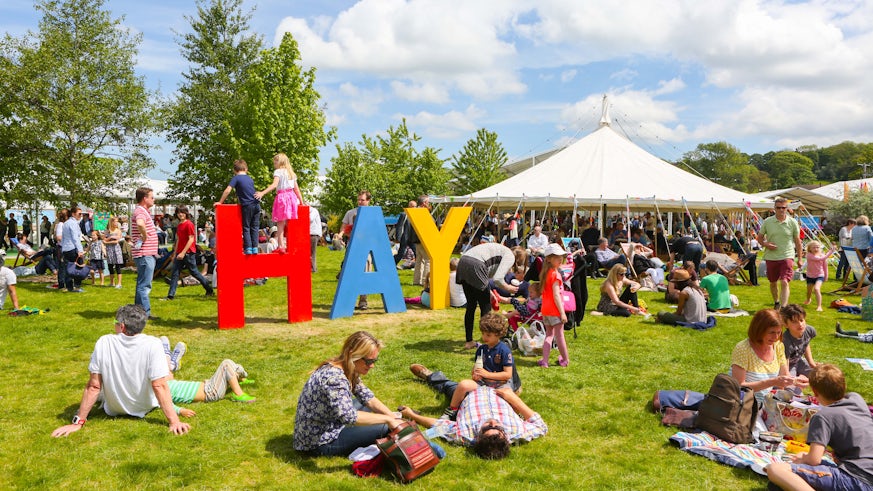Story behind Einstein’s waves breakthrough told at Hay Festival
24 May 2016

The story behind one of the biggest breakthroughs in physics for 100 years is being told as part of the University’s line up at this year’s Hay Festival.
Professor Bangalore Sathyaprakash and Dr Patrick Sutton explain the University’s major role in the discovery of gravitational waves last year and consider the possibility of further revelations.
Other University experts will look at topics as diverse as the threat from objects in space, tax avoidance, air pollution, Roald Dahl, the tiny citizens inside our bodies and establishing a digital literary atlas of Wales.
The Hay Festival runs in the mid Wales town from Thursday 26 May to Sunday 5 June.
Gravitational waves, predicted by Albert Einstein in his famous Theory of General Relativity 100 years ago, made international headlines last September.
Hundreds of scientists around the world were involved in the research with Cardiff University playing a vital role examining data.
Professor Sathyaprakash said: “Gravitational wave observations provide a new tool to understand stupendously energetic phenomena in the Universe such as colliding neutron stars and black holes, collapsing stars and supernovae and flaring and rapidly spinning neutron stars.
“They can help us gain deeper insights into extremes of physics.”
Professor Sathyaprakash said Cardiff University scientists were now looking at the remaining data and hopeful of further revelations.
“We are currently analysing the remaining three months of data from the first observing run,” he said.
“Based on the rates we estimated with the first detection, there is a better than 80% chance that the remaining data will contain at least one more binary black hole merger signal. We expect to release the results in the coming month or two.”
Professor Sathyaprakash and Dr Sutton, from the School of Physics & Astronomy, will appear at 20:30 on Thursday 2 June as part of the Cardiff Series of Cardiff University talks at the festival.
These include Dr Simone Cuff, from the School of Medicine, who is examining the role of bacteria in our bodies, from whether bacteria can protect against cancer to the value of eating bio-live yoghurt.
“A lot of people are really negative about bacteria. Yes, some can make you sick but some others are really important in keeping you well,” she said.
“Recent insights have shown how they help you digest your food, prevent 'bad bacteria' from coming in and making you ill, and can manufacture vitamins for us that our bodies can't make for themselves.”
Dr Cuff’s talk takes place at 20:30 on Tuesday 31 May.
A ground-breaking insight into the place of Wales in the imagination of Roald Dahl will be revealed by Professor Damian Walford Davies, of the School of English, Communication and Philosophy.
He will discuss his landmark new book, Roald Dahl: Wales of the Unexpected, which explores the author through a new lens – the country of his birth and early life – with contributions that examine the presence of Wales in Dahl’s work.
The talk takes place on Thursday 2 June at 17:30 and is one of a number of events involving the University that celebrate the world-famous author in his centenary year.
The threat of objects from outer space is the basis of Dr Paul Roche’s talk as he examines whether we’re likely to go the same way as the dinosaurs.
Astronomers regularly discover huge lumps of rock and ice hurtling past Earth but if some of them were to actually hit us, the consequences could be terrifying. However it’s not all bad news.
"We're becoming increasingly aware of the potential threat posed by space debris, both natural and man-made, but also the possible economic benefits that might come from mining asteroids,” added Dr Roche, of the School of Physics & Astronomy.
His talk is on Friday 3 June at 19:00.
Dr Kelly BéruBé, School of Biosciences and Reader in Biosciences at The Lung and Particle Research Group, discusses the serious health problems that research suggests is caused by lungs being exposed to airborne particles in everyday life.
She will share the latest findings during her talk at 20:30 on Saturday 28 May.
Dr BéruBé is also delivering a separate talk as part of a Welsh Government-funded pilot event in which researchers present 20-minute lectures to students aged 16 to 25 years old. She will discuss the recycling of medical waste tissues as part of the festival’s 2016 theme of sustainability.
Dr Joe O'Mahoney is considering the subject of tax avoidance, a practice at the forefront of recent political and economic news, during a debate at 14:30 on Thursday 26 May.
Dr O’Mahoney, of Cardiff Business School, and guests, will explore how tax evasion works, what can be done about it, and local forms of resistance to these practices.
The establishment of a digital literary atlas of Wales and its borderlands is the subject of a talk by Dr Jon Anderson, from the School of Planning and Geography, on Friday 27 May at 14:30.
This new literary geography is based on the assumption that novels and stories cannot be confined by the covers of a book, but become part of the lived experience of the world around us through the reader’s imagination.